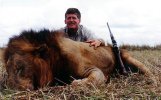billrquimby
AH veteran
- Joined
- May 11, 2009
- Messages
- 190
- Reaction score
- 62
- Location
- Tucson and Greer, Arizona
- Member of
- Safari Club International, Lander One Shot Antelope Hunt Past Shooters Club
- Hunted
- USA, Canada, Mexico, Zimbabwe, South Africa, Zambia, Botswana, Namibia, Argentina, Spain, Mongolia, New Zealand, Australia
Frederick:
I am unaware of any farms in South Africa where a lion has "been raised naturally in an environment where it had to take care of itself for his whole life and live a normal life fighting with other lions and so on."
All of the game farms offering Big Five species that I visited over the many years I travelled to South Africa kept their lions in smaller enclosures with electric fences and regularly fed them donkeys and horses. Their antelopes, buffaloes and zebras were hunted elsewhere on their properties. They may have released a lion or two into the larger areas, but it was seldom long before someone posed for a "hero photo" with them.
I'm well aware that there is no such thing as a "game-proof" fence. Years ago, I spooked a nyala bull and watched it slam into and slide under a high fence without slowing down on Trevor Shaw's place in Natal while I was collecting birds for the SCI wildlife museum in Tucson. I tried to lift the fence at that spot and couldn't.
Sure, wild lions also sometimes escape the Kruger and Kalahari Gemsbok parks, and a few also walk across the Limpopo into RSA from Botswana when the river is dry, but aren't the majority of these taken by locals within a few days after they enter your country?
Not one of the game farmers I know would tolerate for long any lion that entered his farm and began eating his trophy buffalo, kudu, nyala, gemsbok and other big-ticket antelope. If a foreign trophy hunter was available on short notice and willing to pay the price the farmer thought he could get, fine.
If not, that lion soon would be removed -- one way or another.
I must admit I'm biased because of what I witnessed before the recent passage of your country's new rules for lion hunting. Where would you suggest I send a friend who wanted to hunt a lion such as you describe?
Bill Quimby
I am unaware of any farms in South Africa where a lion has "been raised naturally in an environment where it had to take care of itself for his whole life and live a normal life fighting with other lions and so on."
All of the game farms offering Big Five species that I visited over the many years I travelled to South Africa kept their lions in smaller enclosures with electric fences and regularly fed them donkeys and horses. Their antelopes, buffaloes and zebras were hunted elsewhere on their properties. They may have released a lion or two into the larger areas, but it was seldom long before someone posed for a "hero photo" with them.
I'm well aware that there is no such thing as a "game-proof" fence. Years ago, I spooked a nyala bull and watched it slam into and slide under a high fence without slowing down on Trevor Shaw's place in Natal while I was collecting birds for the SCI wildlife museum in Tucson. I tried to lift the fence at that spot and couldn't.
Sure, wild lions also sometimes escape the Kruger and Kalahari Gemsbok parks, and a few also walk across the Limpopo into RSA from Botswana when the river is dry, but aren't the majority of these taken by locals within a few days after they enter your country?
Not one of the game farmers I know would tolerate for long any lion that entered his farm and began eating his trophy buffalo, kudu, nyala, gemsbok and other big-ticket antelope. If a foreign trophy hunter was available on short notice and willing to pay the price the farmer thought he could get, fine.
If not, that lion soon would be removed -- one way or another.
I must admit I'm biased because of what I witnessed before the recent passage of your country's new rules for lion hunting. Where would you suggest I send a friend who wanted to hunt a lion such as you describe?
Bill Quimby

